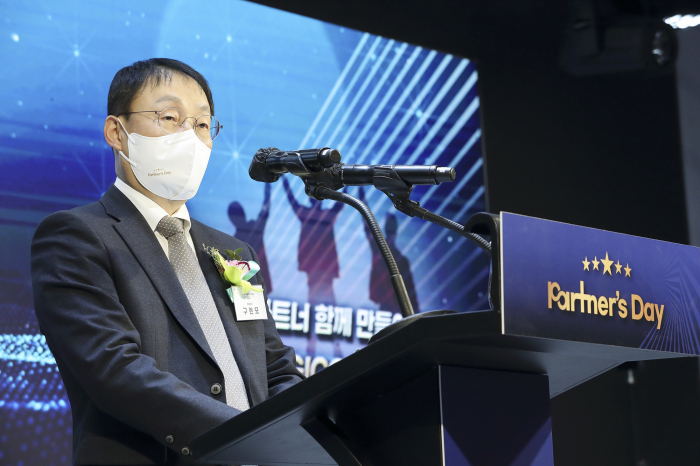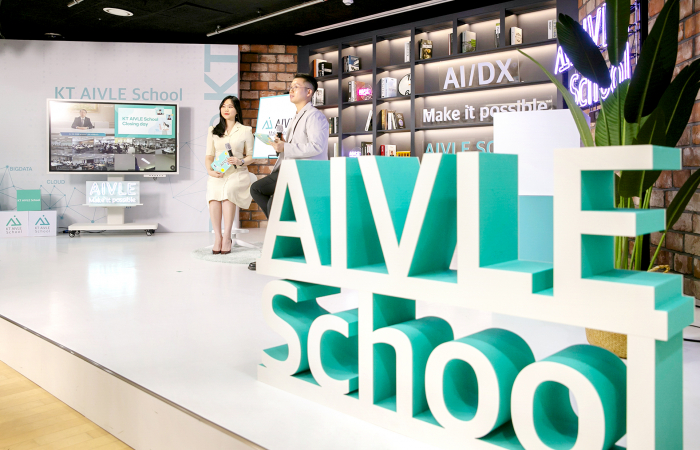KT's transformation beyond telco to digital platform
KT shares hit a near nine-year high on May 16, buoyed by Q1's strongest quarterly results in 12 years
By May 23, 2022 (Gmt+09:00)
LG Chem to sell water filter business to Glenwood PE for $692 million


Kyobo Life poised to buy Japan’s SBI Group-owned savings bank


KT&G eyes overseas M&A after rejecting activist fund's offer


StockX in merger talks with Naver’s online reseller Kream


Mirae Asset to be named Korea Post’s core real estate fund operator



South Korea’s telecom operator KT Corp. surprised the market early this month with a 41.1% on-year surge in first-quarter operating profit, while revenue edged up 4.1%.
The best quarterly results in 12 years were in stark contrast to its stagnant earnings over the past 15 years. They were driven by digital transformation services for companies, into which KT made its inroads just a few years ago.
Its share price spiked to a nearly nine-year high last week. The stock gained almost 18% year-to-date, against an 11% decline in the broader Kospi market during the same period.
Behind the strong earnings were KT's efforts to transform into a digital platform since Ku Hyeon-mo took the reins of the telecom company as CEO in March 2020.
“We needed to enlarge our playground. Our traditional telecom service-based business-to-consumer business had limited growth potential given our population stagnation,” Ku told The Korea Economic Daily in an interview on May 23.
“For KT’s future, we had to explore new areas such as AI, big data and cloud.”
In 2020, KT declared its transformation into a digital platform company from a telco.
With the company for 35 years, Ku has been pivoting toward the business-to-business (B2B) market with a focus on digital transformation services led by artificial intelligence and big data.
“KT’s data storage capacity is as big as eight petabytes (or 8 million gigabytes). Using it for platform businesses and financial services, we can generate sales.”
For the January-March quarter, its operating profit came in at 626.6 billion won on a consolidated basis on sales of 6.3 trillion won.
Last year, its digital service platform Digico KT accounted for 42% of KT’s B2B revenue of 4 trillion won.
KT’s internet data centers and cloud computing services, which the company spun off last year, generated a combined 460 billion won in sales.
Digico KT is targeting 180 billion won in new orders this year, more than twice last year's 80 billion won.
Its share price hit an almost nine-year high of 37,800 won on May 16, its highest intraday point since July 2013.

EDUCATION PROGRAMS
In line with its transformation into digital services, KT launched an AI education program, dubbed KT AIVLE School, at the end of last year. The five-month course offers free education on AI and digital transformation to college students and young job seekers around the country.
“Outstanding students of the program will be recruited by KT and the KT-led AI One Team,” he stated. “We expect about half of the trainees to get a job immediately after completing the course.”
AI One Team is comprised of seven companies, including Hyundai Heavy Industries Co. and Woori Bank; two leading Korean universities; and one academic institute.
KT also kicked off its first in-house education course, the Future Talent Program. The AI and cloud computing course is aimed at giving non-technical employees an opportunity to transfer to other positions after completing the six-month, full-day learning program, regardless of age, title, educational background and current position.
KT also introduced a certification program, AI Fundamentals for Business, to foster AI specialists. The online test assesses AI capabilities needed to carry out relevant jobs.
Those educational and certification programs are based on practical knowledge to tackle the shortage of digital talent and the lack of relevant education programs at academic institutions.
“AI education is needed not only for KT, but also for our country,” Ku said. “We will contribute to nurturing talent for our country, utilizing our resources.”
Ku started his career as a researcher of KT’s economic research institute in 1985. He is the second KT CEO from within since it was privatized in 2002. His predecessors were from outside the company: a former bureaucrat and an ex-Samsung Electronics executive.
As a strategy executive, he led the merger between KT and its wireless telecom unit KTF in 2009 and played a key role in acquiring Nasmedia, a digital media lab, in 2008.
Write to Han-Gyeol Seon and Seung-Woo Lee at always@hankyung.com
Yeonhee Kim edited this article.
-
 Tech, Media & TelecomKT maintains throne in Korea pay TV market in H2 2021
Tech, Media & TelecomKT maintains throne in Korea pay TV market in H2 2021May 19, 2022 (Gmt+09:00)
1 Min read -
 RoboticsKT showcases AI-powered robots, traffic control program at tech fair
RoboticsKT showcases AI-powered robots, traffic control program at tech fairApr 20, 2022 (Gmt+09:00)
3 Min read -
 HealthcareKT taps Vietnam for digital healthcare and AI-powered diagnosis
HealthcareKT taps Vietnam for digital healthcare and AI-powered diagnosisApr 13, 2022 (Gmt+09:00)
2 Min read


